Artichoke leaf extract is a dietary supplement that is derived from the leaves of the artichoke plant. The extract is known for its potential health benefits.
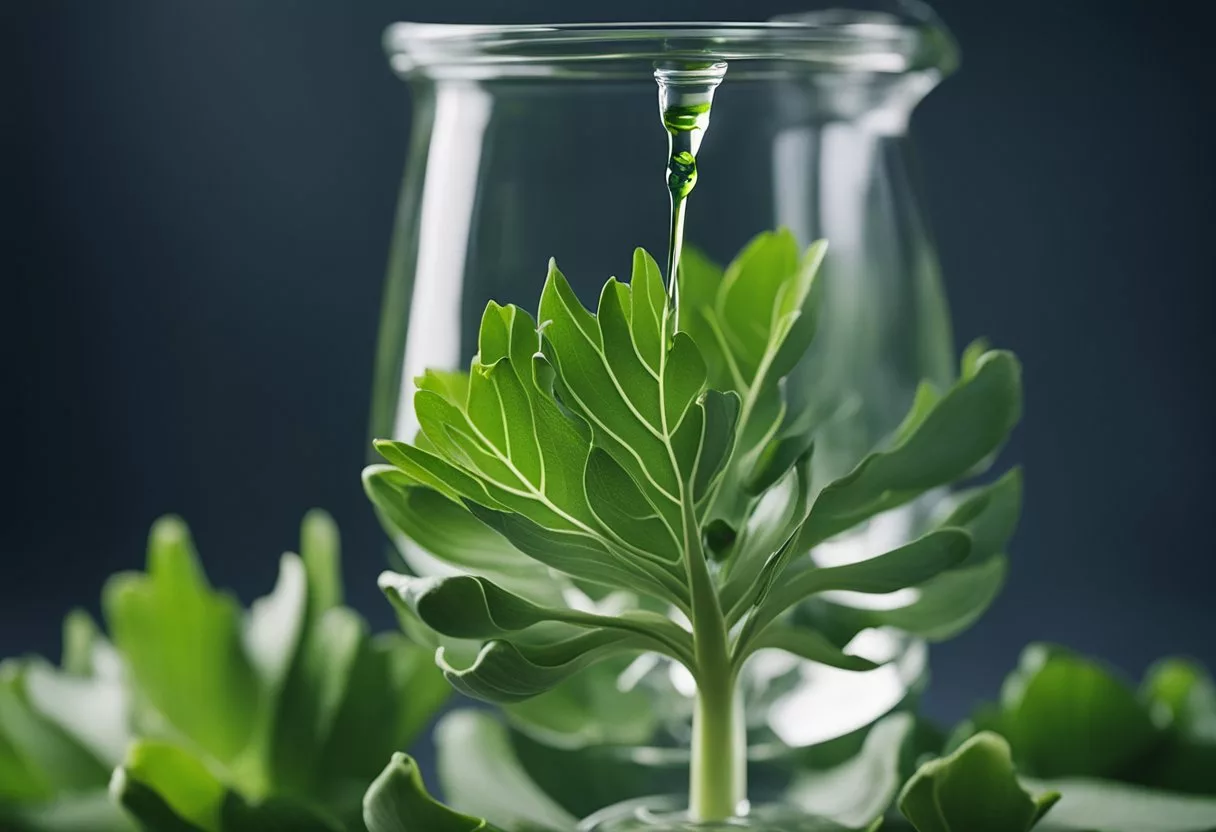
Artichoke leaf extract is a natural remedy that has been used for centuries to treat a variety of health conditions. It is believed to work by increasing bile production in the liver, which helps to break down fats and remove toxins from the body.
The extract is also high in fiber, which can help to regulate digestion and promote bowel regularity.
Artichoke leaf extract is a safe and effective supplement that can provide a range of health benefits. However, it is important to talk to a healthcare provider before taking any new supplements.
Key Takeaways
- Artichoke leaf extract is a natural dietary supplement that can provide a range of health benefits.
- It is a good source of antioxidants and other nutrients, and is believed to work by increasing bile production in the liver.
- While generally safe, it is important to talk to a healthcare provider before taking any new supplements.
Overview of Artichoke Leaf Extract
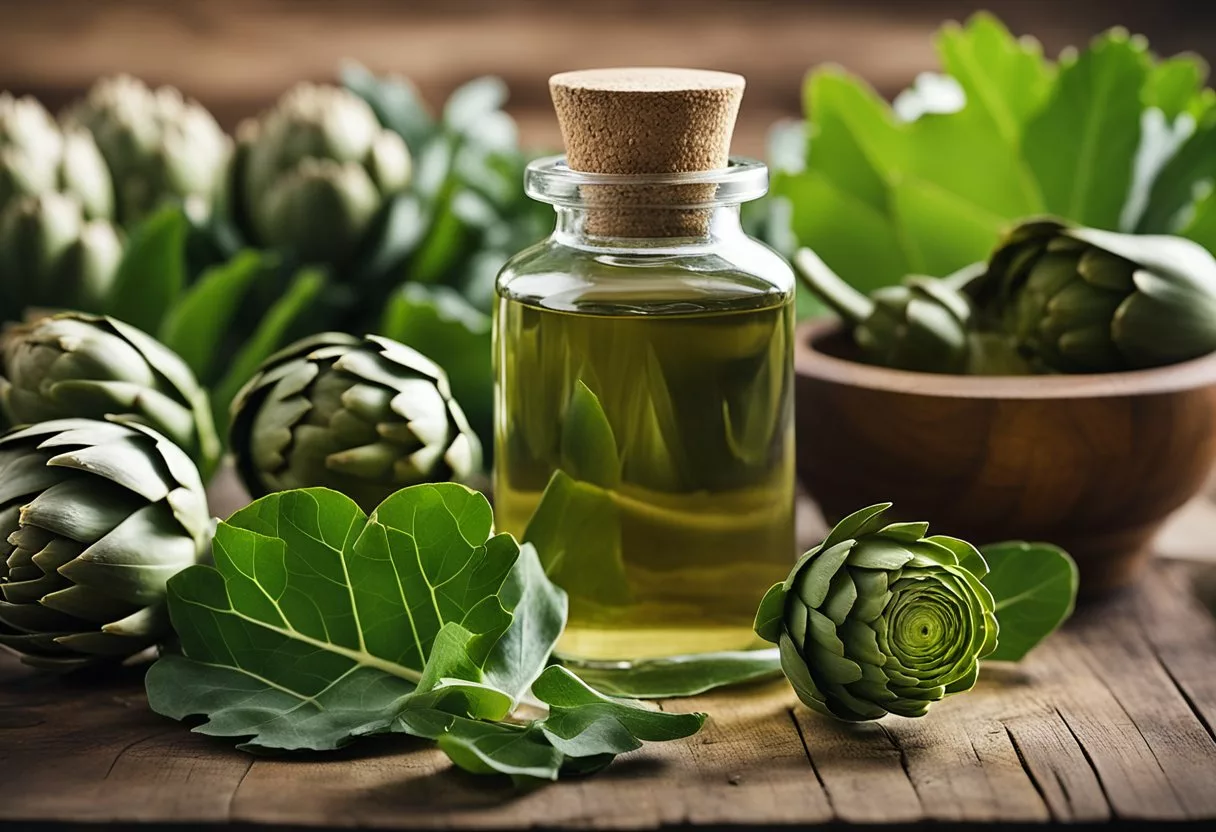
Historical Context
Artichokes have been cultivated for over 2,000 years and were originally grown in the Mediterranean region. The ancient Greeks and Romans prized artichokes for their taste and medicinal properties. In fact, artichokes were believed to be an aphrodisiac and were considered a symbol of fertility and abundance.
Botanical Profile
Artichoke leaf extract is derived from the leaves of the Cynara cardunculus plant, also known as the globe artichoke or Cynara scolymus. The plant is a member of the thistle family and grows up to 6 feet tall.
The leaves are large, spiky, and deeply lobed, with a silvery-green color.
Artichoke leaf extract contains a variety of bioactive compounds, including cynarin, chlorogenic acid, and luteolin. These compounds are believed to have antioxidant, anti-inflammatory, and cholesterol-lowering properties.
Artichoke leaf extract has been used for centuries as a traditional medicine for a variety of ailments, including liver and gallbladder disorders, digestive issues, and high cholesterol. Today, it is commonly used as a dietary supplement for its potential health benefits.
Nutritional Composition
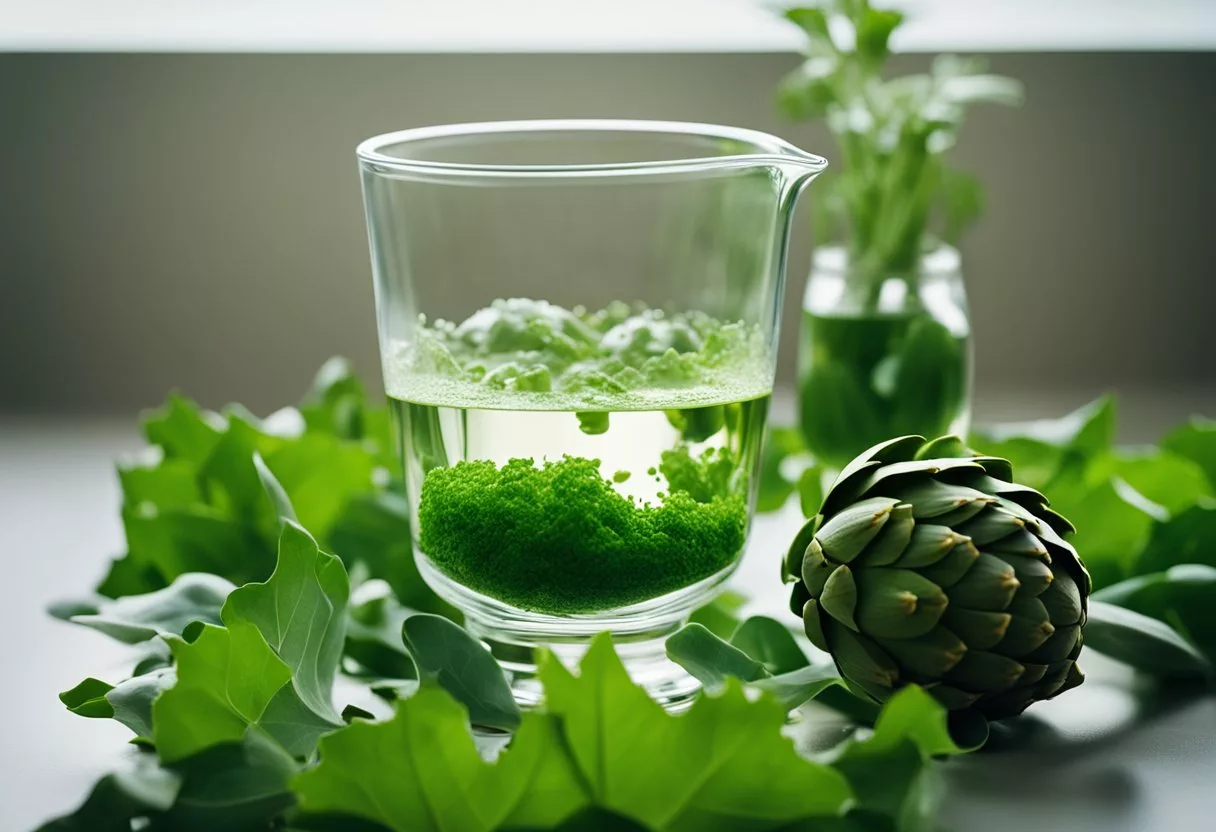
Artichoke leaf extract is a natural supplement that is rich in essential vitamins, minerals, and phytochemicals. The extract is made from the leaves of the artichoke plant, which is a member of the thistle family. The following are the nutritional components of artichoke leaf extract:
Vitamins and Minerals
Artichoke leaf extract is a good source of many essential vitamins and minerals. It contains significant amounts of vitamin C, which is an important antioxidant that helps to protect the body from damage caused by free radicals.
It also contains niacin, which is essential for healthy skin, nerves, and digestion. In addition, artichoke leaf extract contains magnesium, potassium, phosphorus, and iron, which are all important minerals that are essential for good health.
Phytochemicals
Artichoke leaf extract contains several important phytochemicals, including caffeoylquinic acid, polyphenols, and flavonoids. These compounds have been shown to have antioxidant and anti-inflammatory properties, which can help to protect the body from damage caused by free radicals.
They may also help to reduce the risk of chronic diseases such as heart disease, cancer, and diabetes.
In addition to these nutrients, artichoke leaf extract also contains inulin, which is a type of fiber that can help to promote healthy digestion. It is also low in calories, making it a good choice for people who are trying to lose weight or maintain a healthy weight.
Health Benefits
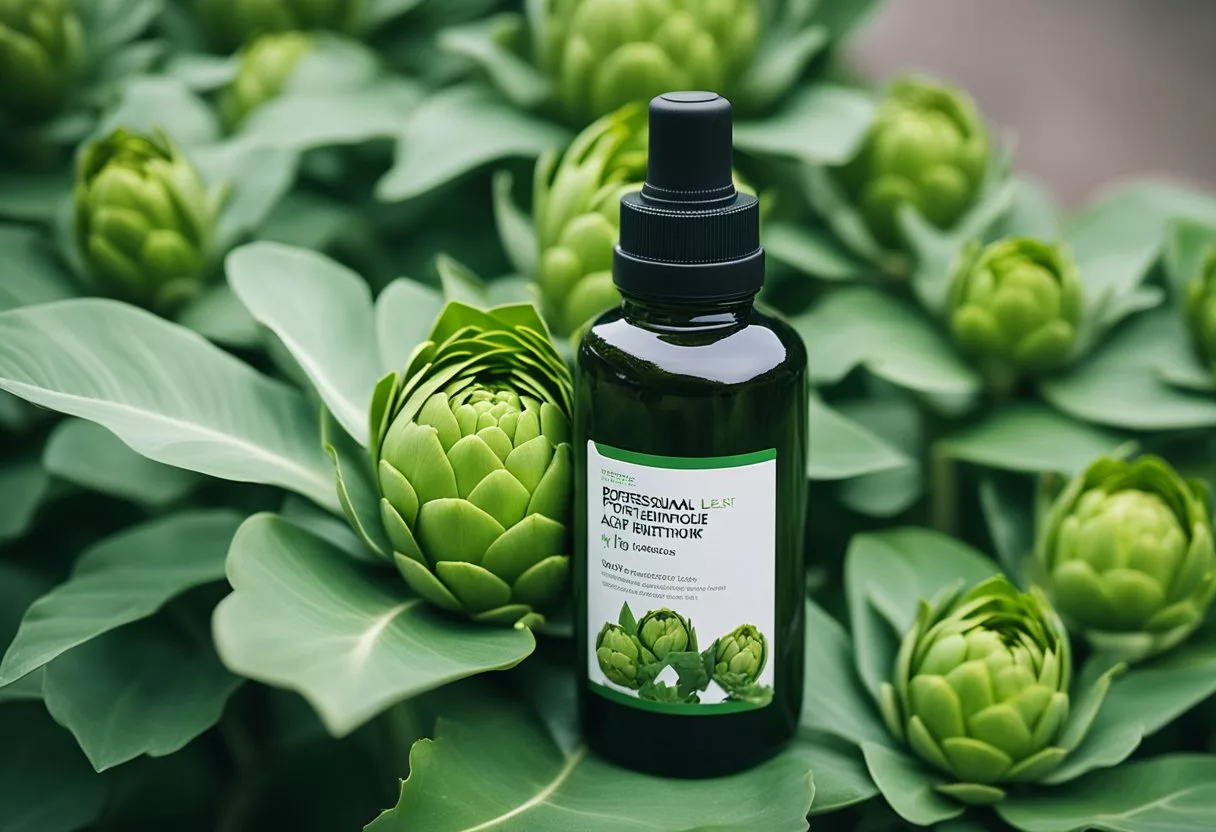
Artichoke leaf extract has been used for centuries for its medicinal properties. Today, modern research has confirmed many of its health benefits.
Liver Health
Studies have found that artichoke leaf extract can support liver health by increasing bile production and reducing liver inflammation. The extract has also been shown to improve liver function and reduce liver enzymes in people with non-alcoholic fatty liver disease.
Digestive Support
Artichoke leaf extract can aid in the digestion of fats and promote healthy digestion. It has been shown to reduce symptoms of dyspepsia, a digestive disorder that causes discomfort and pain in the upper abdomen.
Cardiovascular Benefits
Artichoke leaf extract has been found to have cardiovascular benefits. It can help lower cholesterol levels, particularly LDL cholesterol and triglycerides, and reduce blood pressure.
Artichoke leaf extract may also help prevent atherosclerosis, a condition where plaque builds up in the arteries, and reduce the risk of heart disease.
Antioxidant Properties
Artichoke leaf extract contains antioxidants, including cynarin and flavonoids, which can help protect cells from damage caused by free radicals. These antioxidants may also have anti-cancer properties.
Blood Sugar Control
Artichoke leaf extract has been shown to help regulate blood sugar levels, making it a potential treatment for people with diabetes. It may also help prevent metabolic syndrome, a group of conditions that increase the risk of heart disease and diabetes.
Gastrointestinal Effects
Artichoke leaf extract has been used for centuries to relieve gastrointestinal issues. It contains compounds that help soothe the digestive system and promote healthy digestion. Here are some of the gastrointestinal benefits of artichoke leaf extract.
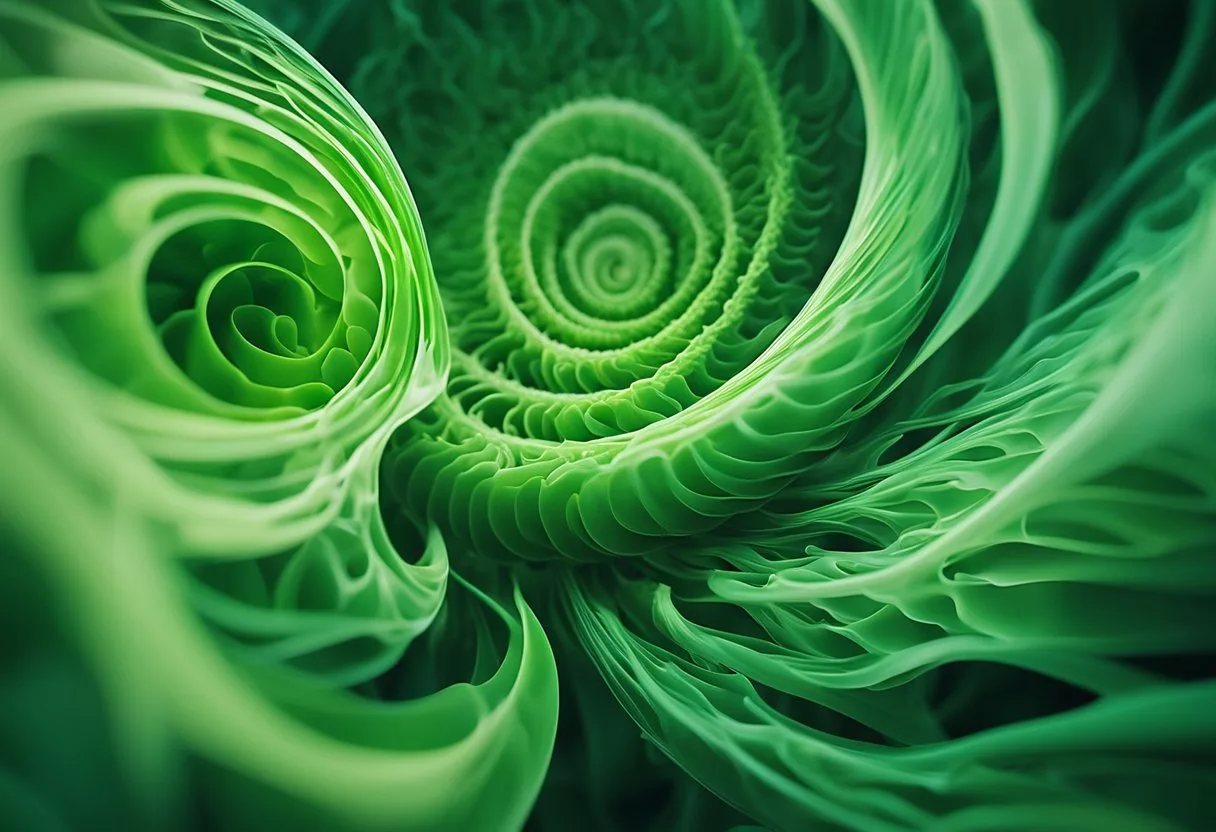
Irritable Bowel Syndrome
Artichoke leaf extract may be beneficial for those with irritable bowel syndrome (IBS). IBS is a common gastrointestinal disorder that affects the large intestine.
Symptoms include abdominal pain, bloating, gas, diarrhea, and constipation. According to a study published in the Journal of Alternative and Complementary Medicine, artichoke leaf extract was found to be effective in reducing IBS symptoms. The extract helped to reduce bloating, gas, and abdominal pain in study participants.
Bloating and Gas Relief
Artichoke leaf extract may also help relieve bloating and gas. Bloating and gas are common digestive issues that can cause discomfort and embarrassment.
According to a study published in the Journal of Ethnopharmacology, artichoke leaf extract was found to be effective in reducing bloating and flatulence in study participants. The extract helped to reduce the production of gas in the digestive system, which in turn reduced bloating and flatulence.
Artichoke leaf extract has also been found to be effective in relieving indigestion and upset stomach. It works by increasing the production of bile, which helps to break down fats and aid in digestion.
Additionally, artichoke leaf extract may help relieve constipation by promoting bowel movements.
Potential Side Effects
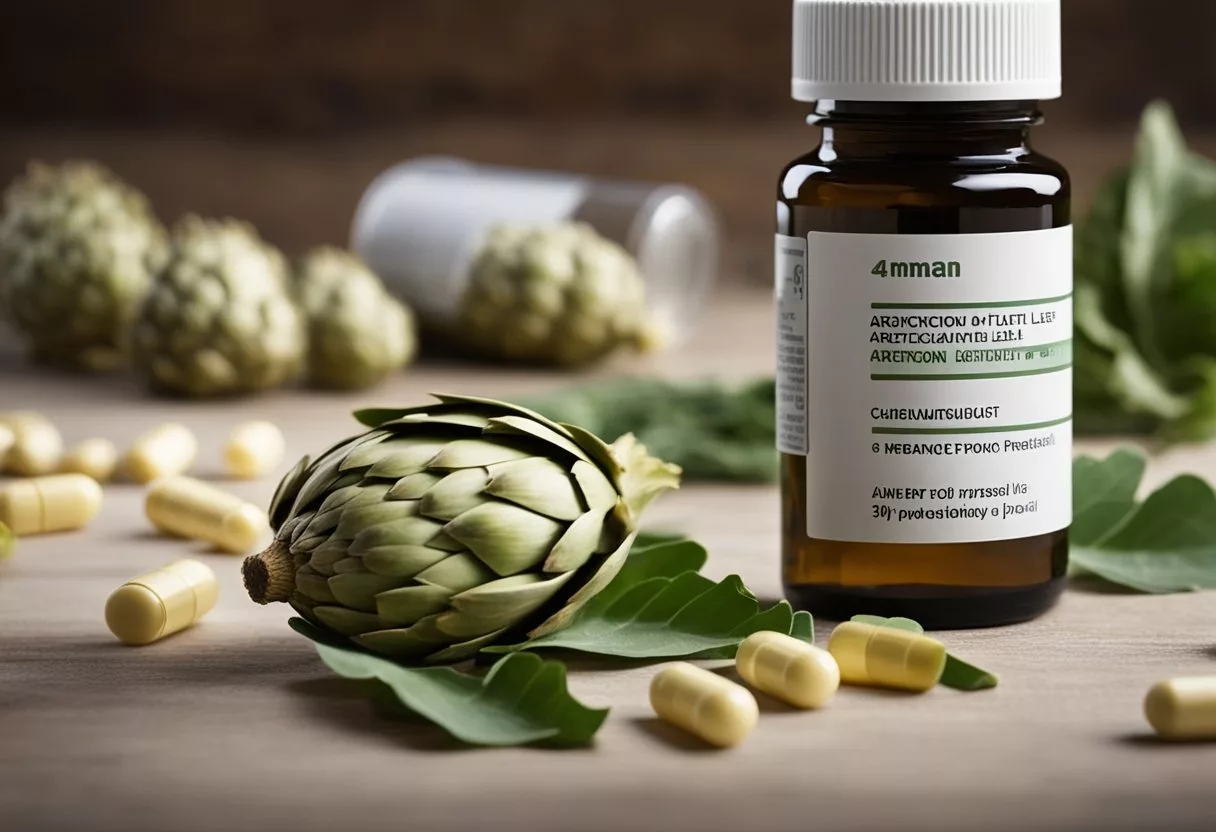
Artichoke leaf extract is generally considered safe when taken in appropriate amounts. However, some people may experience side effects. In this section, we will discuss the common adverse reactions, allergic responses, and drug interactions associated with artichoke leaf extract.
Common Adverse Reactions
The most common side effects associated with artichoke leaf extract are digestive in nature. These include gas, bloating, burping, flatulence, painful abdominal cramps, loose stools, and diarrhea.
These side effects are usually mild and go away on their own after a few days. However, if they persist or become severe, it is recommended to stop taking artichoke leaf extract and consult a healthcare provider.
Allergic Responses
While rare, some people may experience an allergic reaction to artichoke leaf extract. Symptoms of an allergic reaction may include hives, itching, swelling of the face, lips, tongue, or throat, difficulty breathing, and chest tightness.
If you experience any of these symptoms after taking artichoke leaf extract, stop taking it immediately and seek medical attention.
Drug Interactions
Artichoke leaf extract may interact with certain medications, including those used to lower cholesterol levels, such as statins.
Taking artichoke leaf extract with these medications may increase the risk of muscle damage and liver toxicity. Therefore, it is recommended to consult a healthcare provider before taking artichoke leaf extract if you are taking any medications.
In addition, artichoke leaf extract may also interfere with the absorption of iron and other minerals. Therefore, it is recommended to take artichoke leaf extract at least two hours before or after taking mineral supplements.
Usage and Dosage
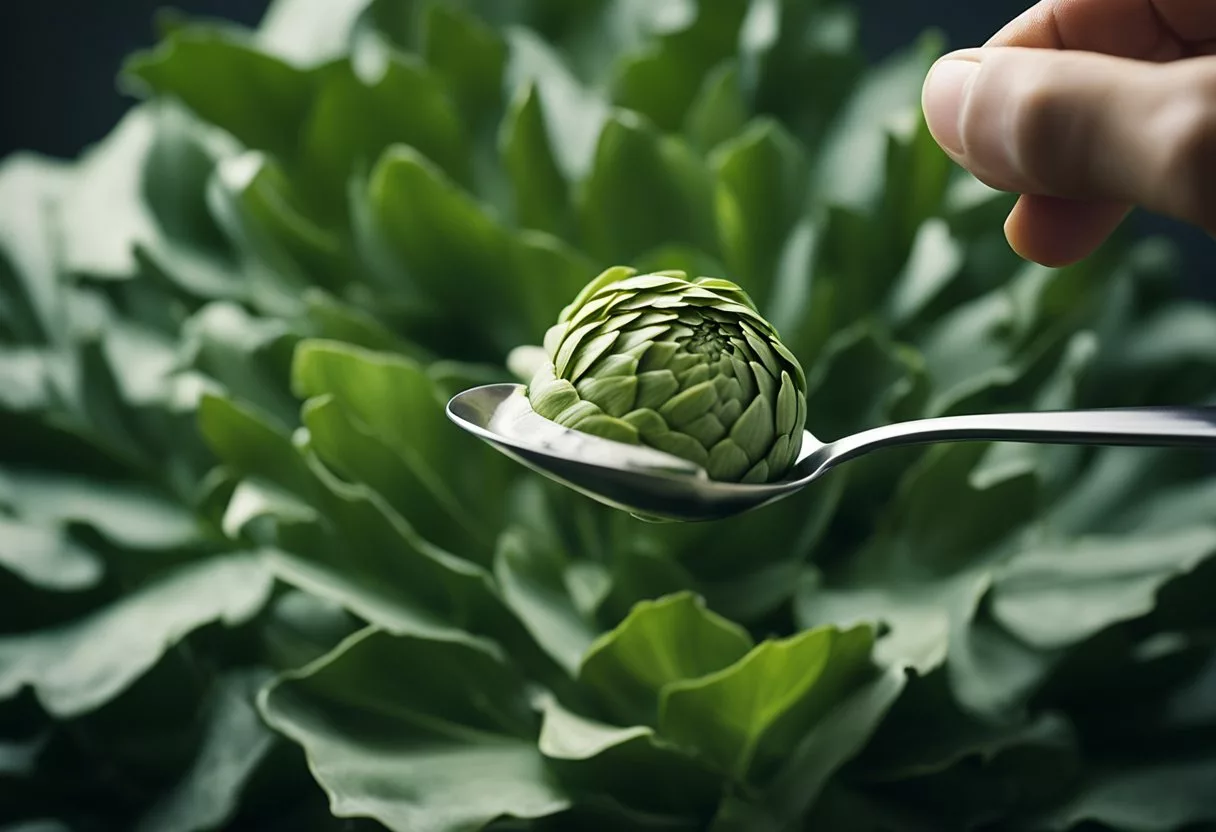
Supplementation Forms
Artichoke leaf extract is available in various forms, including capsules, tablets, and liquid extracts. Capsules and tablets are the most common forms of supplementation.
Some supplements may also contain other ingredients, such as milk thistle or dandelion root, which are believed to support liver health.
Dosage Recommendations
The appropriate dosage of artichoke leaf extract may vary depending on the individual’s health status, age, and other factors. It is important to consult with a healthcare professional before starting any supplementation regimen.
According to a study published in the International Journal of Food Sciences and Nutrition, a daily dose of 1,800-1,920 mg of artichoke leaf extract may be effective in reducing cholesterol levels in adults with mild to moderate hypercholesterolemia. Another study published in the same journal reported that a daily dose of 1,280 mg of artichoke leaf extract was effective in reducing symptoms of irritable bowel syndrome (IBS) in adults.
However, these dosages may not be appropriate for everyone. Some supplements may contain higher or lower concentrations of the active ingredients than others, which can affect the appropriate dosage.
In general, it is recommended to start with a lower dosage and gradually increase it over time, as tolerated. It is also important to follow the manufacturer’s instructions for dosing and preparation.
Considerations for Specific Groups

Pregnancy and Breastfeeding
There is insufficient evidence to determine the safety of artichoke leaf extract during pregnancy and breastfeeding. Therefore, it is recommended that pregnant and breastfeeding women avoid using artichoke leaf extract to prevent any potential harm to the developing fetus or infant.
Children and Adolescents
There is limited research on the use of artichoke leaf extract in children and adolescents. Therefore, it is recommended that parents consult with a healthcare professional before giving artichoke leaf extract to their children.
Chronic Disease Considerations
Artichoke leaf extract may have potential benefits for individuals with hyperlipidemia, a condition characterized by high levels of cholesterol and triglycerides in the blood. However, individuals with kidney disease should avoid using artichoke leaf extract as it can increase the risk of kidney damage.
Artichoke leaf extract may also have potential benefits for weight loss and reducing waist circumference. However, individuals with heart disease should consult with a healthcare professional before using artichoke leaf extract as it may interact with certain medications used to treat heart disease.
In addition, artichoke leaf extract may cause side effects such as nausea and spasms in some individuals. Therefore, individuals with a history of gastrointestinal issues should use artichoke leaf extract with caution and consult with a healthcare professional if they experience any adverse effects.
Regulatory Status
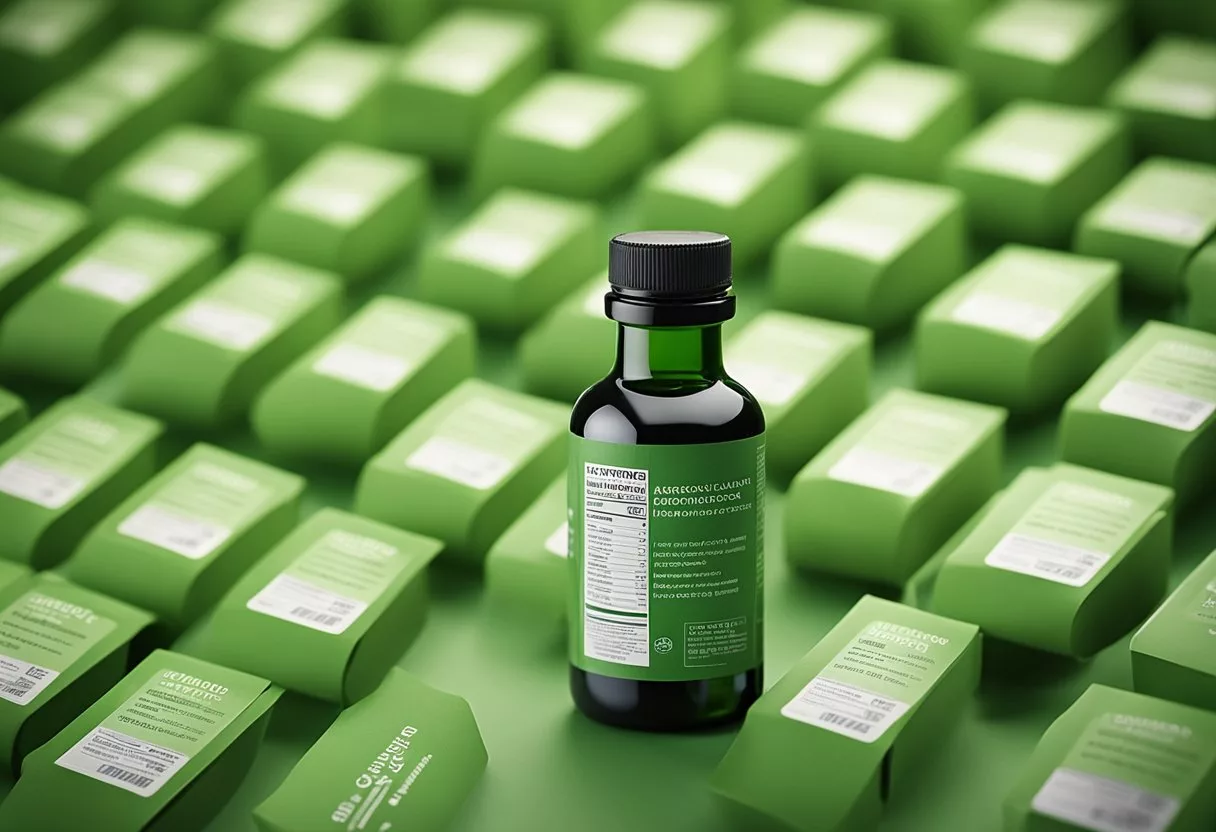
FDA Position
The FDA does not currently regulate artichoke leaf extract as a dietary supplement or as a drug. However, the FDA does have regulations in place for the use of artichoke leaf extract in food products. Artichoke leaf extract is generally recognized as safe (GRAS) for use in food products, and it is used as a flavoring agent in a variety of foods, including soups, sauces, and dips.
Although the FDA has not approved artichoke leaf extract as a drug, some studies have suggested that it may have potential health benefits, such as reducing cholesterol levels and improving liver function. As a result, some manufacturers have marketed artichoke leaf extract as a dietary supplement for these purposes.
It is important to note that the FDA does not regulate dietary supplements in the same way that it regulates drugs. Dietary supplements are not subject to the same rigorous testing and approval process as drugs, and manufacturers are not required to prove the safety or effectiveness of their products before they are sold to consumers.
Consumers should be aware that the safety and effectiveness of artichoke leaf extract as a dietary supplement have not been fully established, and they should consult with a healthcare professional before using any dietary supplement, including artichoke leaf extract.
Culinary Uses
Artichokes in Cuisine
Artichokes are a popular vegetable in Mediterranean cuisine, particularly in Italy, Spain, and France. The edible portion of the plant is the flower bud before it blooms. The bud is typically cooked by boiling, steaming, or grilling.
Once cooked, the leaves are removed and the tender flesh at the base of each leaf is eaten. The heart of the artichoke, which is the meaty base of the bud, is also edible and is considered a delicacy.
Artichokes can be prepared in a variety of ways, including stuffed, grilled, or roasted. They are often served with a butter or aioli sauce and are a popular addition to salads, pasta dishes, and vegetable side dishes. Artichokes are also commonly used in dips, such as spinach and artichoke dip.
Extract Applications in Food
Artichoke leaf extract can be used as a natural flavoring agent in food products. It has a slightly bitter taste and is often used in herbal teas and dietary supplements. The extract is also used in some alcoholic beverages, such as vermouth.
In addition to its flavoring properties, artichoke leaf extract has been shown to have potential health benefits. It may help to lower cholesterol levels and improve digestive health. However, more research is needed to fully understand the effects of artichoke leaf extract on human health.
Agricultural and Environmental Aspects
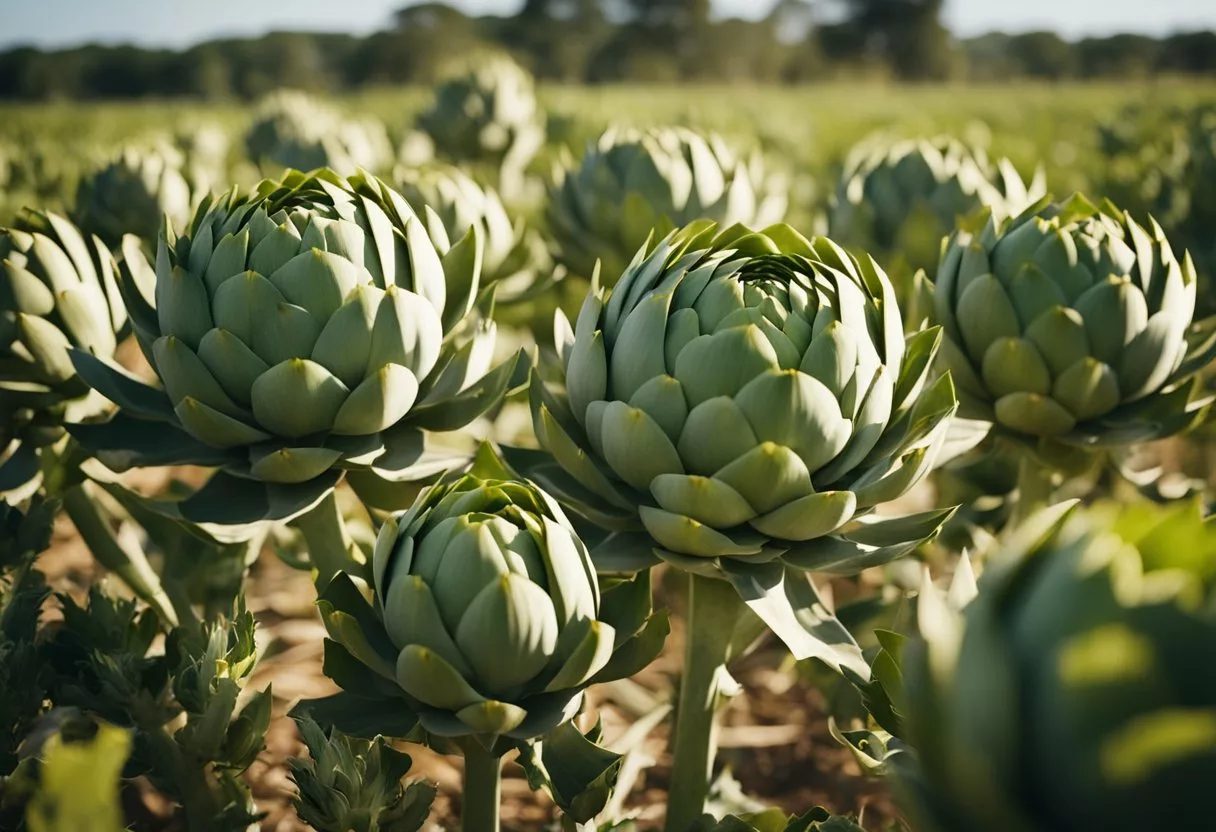
Cultivation
Artichoke leaf extract is derived from the leaves of the globe artichoke plant, scientifically known as Cynara cardunculus. The artichoke plant is a type of thistle that belongs to the Asteraceae family. It is a perennial plant that can be grown in a variety of climatic conditions.
Cultivation of the artichoke plant requires well-drained soil and a sunny location. The plant is propagated through seeds or vegetative methods such as suckers or root cuttings. The plant requires regular watering and fertilization to promote healthy growth. The leaves of the artichoke plant are harvested for their medicinal properties.
Sustainability
Artichoke leaf extract is a natural product that is extracted from the leaves of the artichoke plant. The production of artichoke leaf extract has minimal impact on the environment. The artichoke plant is a perennial plant that can be grown without the use of chemical fertilizers or pesticides.
The artichoke plant is also a low water user and can be grown in areas with limited water resources. The plant is also a good source of food for pollinators such as bees and butterflies.
Furthermore, the production of artichoke leaf extract can also contribute to the reduction of food waste. Agricultural studies have revealed that the bracts of the artichoke plant account for 65% of the overall waste biomass. The use of artichoke leftovers for the production of artichoke leaf extract can help reduce waste and promote sustainability.
Frequently Asked Questions
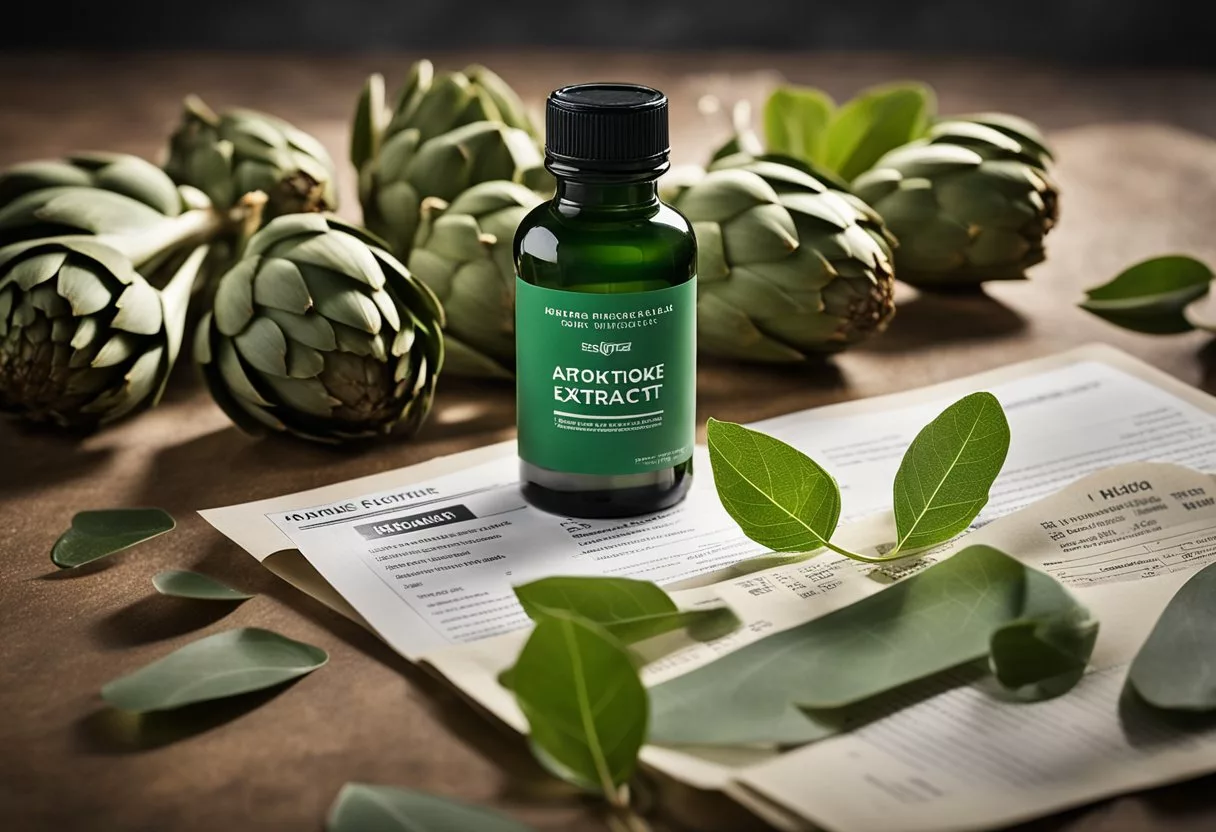
What are the potential health benefits of taking artichoke leaf extract?
Artichoke leaf extract has been shown to have potential health benefits, including reducing cholesterol levels, improving digestion, and supporting liver function. Additionally, artichoke leaf extract may have anti-inflammatory and antioxidant properties, which may help protect against certain diseases and conditions.
How can artichoke leaf extract aid in liver health?
Artichoke leaf extract has been shown to support liver function by increasing bile production and reducing liver inflammation. Additionally, artichoke leaf extract may help protect the liver against damage caused by toxins and other harmful substances.
What known side effects are associated with artichoke supplement use?
While artichoke leaf extract is generally considered safe, some people may experience mild side effects such as gas, bloating, or stomach upset. Additionally, artichoke leaf extract may interact with certain medications, so it is important to speak with a healthcare provider before taking this supplement.
Are there any specific groups of people who should avoid using artichoke extract?
People who are pregnant or breastfeeding should avoid using artichoke extract, as there is limited research on its safety in these populations. Additionally, people with gallbladder or bile duct problems should avoid using artichoke extract, as it may worsen these conditions.
How does artichoke leaf extract contribute to weight loss efforts?
Artichoke leaf extract may contribute to weight loss efforts by increasing bile production, which can help improve digestion and reduce the absorption of dietary fat. Additionally, artichoke leaf extract may help regulate blood sugar levels, which can help reduce cravings and promote feelings of fullness.
What is the recommended dosage of artichoke extract for promoting liver health?
The recommended dosage of artichoke extract for promoting liver health varies. However, typical dosages range from 300-640 mg per day.
Speak with a healthcare provider to determine the appropriate dosage for your specific needs.